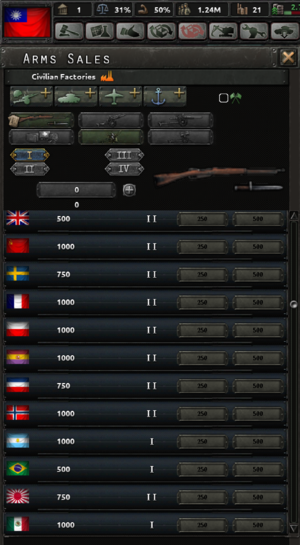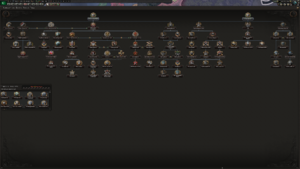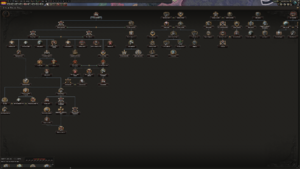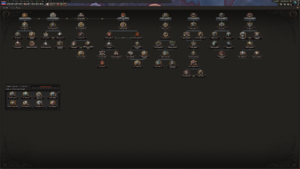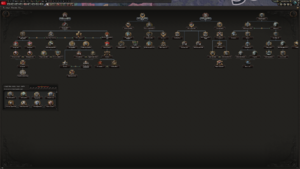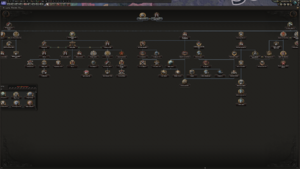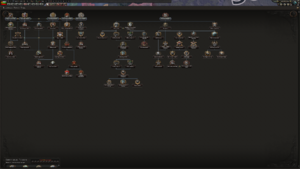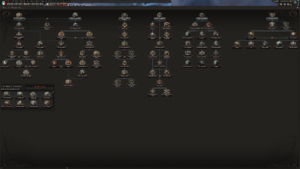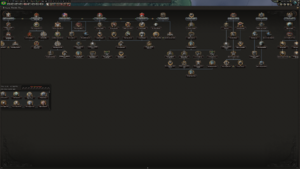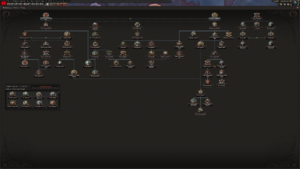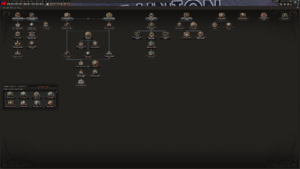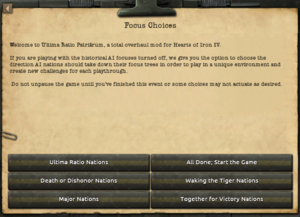开发
版本
论坛
创意工坊链接
Ultima Ratio Patriarum, The Last Argument of Nations, is a Hearts of Iron IV total overhaul mod created by RivtalDM.
From the creators of the popular Veritas et Fortitudo mod for EUIV, the same attention to historical detail and commitment to innovative and immersive new mechanics are brought to Hearts of Iron IV.
Ultima Ratio Patriarum, Introduction
The Current Team
- RivtalDM - Project Lead, Designer
- Penguintopia - Contributor and Consultant
Concepts and Mechanics
Global Arms Trade
Buy or sell military equipment (not ships, that's still not possible as they are never in an 'inventory' status) in a newly crafted, unique interface. Offer your wares to the world or limit transactions to close allies; use your civilian factories to purchase arms when your own military factories are insufficient.
Uprisings and Revolutions
When a coup is staged in any colony state, preference is first given to freeing any nations who hold cores on those states provoking independence wars in place of a civil war. It is also possible to have core foreign states on your border defect to your nation, though this will almost invariably result in a war with their previous owner. Not only is this function more realistic than the traditional Hearts of Iron coup, it also makes it available in a style that is palatable to multiplayer games and less prone to ruin an entire nation. This is effective only when the coup is staged in states where other cores exist and the further from a nation's heartland the better; coups staged in southern France for example, will still have their traditional effect of a civil war while one staged in N. Africa will result in independence wars engulfing the region. The number of neighboring states which join such an independence movement is still based on the support of the ideology behind the coup within the parent nation.
AI Improvements & Balance
Numerous tweaks to the AI to tell it to behave more historically (in terms of when and in what order it selects focuses, how it conducts diplomacy and peace conferences). URP has opted for a path of teaching the AI to make historically representative divisions and armies while rebalancing the game to make min/maxing less extreme rather than trying to teach the AI how to min/max.
Additional Subject Types
Added a Personal Union subject type for Iceland under Denmark; doesn't do much special except be historically accurate. Additionally, subjects within China now have unique relations to one another of Field Commander, Military Governor, and Provincial Governor. Many of the Chinese warlords now start out with one of these relations to the Nationalist Government.
Focus Trees
As well as many historical tweaks to existing trees, URP adds the following:
- Egypt
- Historically Egypt remained strictly neutral despite nominally being part of the British Empire, going so far as to initially fail to raise any soldiers to defend against the Italian invasion. That option is in their focus tree (though it's really boring) as well as options to break free of British rule or more actively support the allies. Egypt starts out as neutral and all ideologies are available through their focus tree.
- Spain
- The Spanish Civil War features prominently on the Spanish focus tree, designed to be used by both sides. It features a democratic path whereby one can avoid the civil war as well as an option for monarchist elements to take control of the Nationalist cause and try to revive the Spanish empire. Spain starts out as democratic and all ideologies are available through their focus tree.
- Siam
- A nominal democracy in 1936 where half the parliament was officially appointed by the monarch (who was a child in Switzerland) and really appointed by his generals. Siam has the historical path to reform its identity as the fiercely nationalist Thailand and side with the Japanese or alternatives to ally with factions in China, the Allies, or seek protection from the United States. Siam starts out as neutral and all ideologies are available through their focus tree.
- Turkey
- The last years of Ataturk's leadership were marked by continued reform both economically and culturally in Turkey. Turkey begins with much work to do to modernize the economy, and the neutral government cannot be changed so long as Ataturk lives. Once he passes away, the struggle for power leaves Turkey open to any ideological shift (though some are easier than others).
- Greece
- Greece is suffering exceptionally even by the standards of the Great Depression and her parliament in 1936 is deadlocked with no clear majority. Greece has several options to break the political deadlock including the historical 4th of August regime that led to essentially authoritarian rule. Greece begins neutral and all ideologies are available through their focus tree.
- Bulgaria
- Suffering from the Treaty of Neilly-sur-Seine that penalized her at the end of the Great War, Bulgaria must rearm in secret in order to be ready for the coming storm. The historical path is available whereby Boris II will attempt to steer the nation on a neutral path despite outside forces as well as paths to join one of the various factions. join the Balkan Pact guarantees, or seek a union with Yugoslavia.
- Mexico
- Yes, I know Paradox has their own Mexico focus tree in Man the Guns but we continue to use ours because I absolutely cannot stand some things about it and haven't had time to refashion it yet. Paths are available for any ideology and one of the most left-wing governments in the Western Hemisphere at the time doesn't need a civil war to become communist (crazy, I know) as well as a historical path of "belligerent neutrality" (that's what they called it, I don't make this stuff up).
- Brazil
- Scarcely industrialized and suffering from severe drought in 1936, Brazil has a long way to go in order to modernize its economy. Historically help came in the form of US investment both in rubber production and in infrastructure as the US built airbases and ports in Brazil for their own use. Alternatively, Brazil can seek this aid from Germany or the Soviet Union. Politically Brazil begins divided; its neutrality can be solidified by the Estado Novo regime or they can seek another ideology through their focus tree.
- Mongolia
- In 1936 Mongolia was not yet officially part of the comintern and their government was much closer to a fascist regime than a communist one. Historically some Soviet-backed leadership adjustments and their own purge coinciding with Stalin's fixed that up right quickly, but in 1936 it is still conceivable that Premier Genden would use (as he had threatened) Japanese support to distance himself from the Soviets. Mongolia only has options to follow communism or fascism, and this is another one where the historical path is downright boring and no one but the AI would use it. Alternatively, Mongolia can take a more assertive stance to try and get more out of their alliance with the Soviets, use the Japanese to help take down the Soviets, or use the Japanese to secure Inner Mongolia then turn on them for territories in Manchuria.
- Nationalist China
- The difference between China with Waking the Tiger and without finally became too much to rationally balance so I wrote our own focus tree for China to use in both cases. Don't worry, if you have the DLC you still get the way cooler shared foreign support tree instead of the whole six focuses I wrote for foreign support without the DLC but I needed to stick to strictly historical things and not copy any part of Paradox' DLC.
Additional Nations
Most of the cores I had previously added were put in by Paradox in 1.6 (almost 30 nations of mine made obsolete but Paradox generally has better flags). URP does still add a few releasable nations:
- Alawite and Druze states in Syria (when France is forced to renegotiate the status of Syria in 1936, they have an option to divide it up or leave it united)
- Some additional nations were also added to the game for increased historicity
Present At Start
- French Indochina (This facilitates the historical Franco-Thai war without involving the entire Vichy State; begins as a colony of France)
- Egypt (A historically semi-independent state of the British Empire whose neutral government was highly suspect during the war)
- Iceland (A nation in a unique personal union with Denmark; historically they remained strictly neutral when Denmark was invaded though spend most of the war occupied by the Allies)
- Additional Chinese Warlords
- Guangdong
- Shandong
- Xikang
- Sichuan
- 36th Division
- Northeast Army
Appear In-Game
- Vichy (As a unique tag, Vichy can serve it's historical purpose of denying the Allies access to French colonial possessions)
Historical Changes
A highlight of the biggest changes to how the game handles situations in order to achieve more historical outcomes.
Vichy Representation
A unique tag exists for the Vichy state, allowing it to remain neutral (as it did for a few years). The French state proper still becomes Free France with a series of decisions available to forment uprisings and initiate border conflicts against Vichy in the colonies
Sino-Japanese War
Vanilla mechanics do not well represent a stalemate on a wide front and the AI is prone to chew up casualties at an alarming rate in China. In vanilla the conflict usually reaches a conclusion whereas historically it dragged on for eight long years. To represent this, Japan has the ability (via focus tree) to "settle in" to an occupation once they control certain coastal states in China. From that point forward, a stalemate ensues with regular border conflicts forcing Japan to continue to garrison China without forcing them to commit their entire army to the detriment of their other conflicts.
Obsolete Mechanics
Focus Choices For Alternate History
URP used to have a startup event I designed that allowed you to tell the AI which options of its focus tree to take when you played with historical focuses turned off. As of 1.6, Paradox implemented a similar feature with their game rules that is much more aesthetically pleasing so we now make use of that feature instead.
